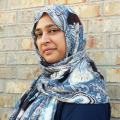Donald Trump’s attack against Ghazala Khan, the Gold Star Mother of Captain Humayun Khan, and the resultant #CanYouHearUsNow hashtag campaign is still reverberating around us on social media.
But while hashtag campaigns come and go, strong, independent Muslim women in America and abroad are here to stay. Americans know of a few of course, but not all. Malala Yusufzai is a household name, but how many know Shirin Ebadi, the first (and not last) Muslim woman Nobel Peace Prize winner? Everyone has heard of oppressed Pakistani women, but how many know that Pakistan gave birth to Benazir Bhutto, the first ever democratically elected female head of state in the Muslim world?
In fact dedicated, independent, and influential Muslim women have been a reality since the early days of Islam in seventh-century Arabia. Here are five ways that Muslim women defy expectations and media stereotypes every single day:
1. Islam teaches women to participate fully in public life. The Prophet Muhammad’s first wife Khadija was a wealthy and powerful businesswoman who supported her husband financially. Another of his wives, Ayesha, became the commander of the Muslim army in the Battle of the Camel after his death. Muslim women were fighting in battles with men, teaching religion to men, and opening universities in the early days of Islam and thereafter.
2. In the last few decades, Muslim women have taken leadership roles in their countries in a way that women in the United States have not done yet. While we are still dreaming of a female president, nine Muslim women have been heads of states in their nations. Pakistan’s Benazir Bhutto has been followed by many others, including in Bangladesh, Indonesia, Senegal, and more. Read the full list of these leaders here.
3. Muslim women are one of the most highly educated female religious groups in the United States. They form part of every aspect of professional life, and strive hard to contribute to their society, wherever they live.
4. Muslim women in Middle Eastern and Asian countries are no less successful or powerful. This is true in more liberal spaces like Turkey and in conservative societies like the United Arab Emirates. Muslim women, like the 16 entrepreneurs featured in this Buzzfeed article and the book Arab Women Rising, shatter stereotypes and make a huge difference in the world.
5. The future of Muslim women in America is bright. Young women are entering the political arena in record numbers, as well as in competitive sports. Fencer Ibtihaj Mohammad just became the first to represent America in the Olympics while wearing a hijab. In fact, Muslim women from all nations are breaking stereotypes as they compete in a number of sporting events in Rio.
So while we don’t need a hashtag campaign to remind the world of the power of Muslim women, their invaluable contributions, or their value regardless of gender and politics, we do need to share stories of their resilience and courage. We do need to call it out when politicians like Donald Trump misrepresent us and try to limit us through stereotypes.
Muslim women in the United States and around the world are contributing to progress and discovery. It’s time the world knew about them.
Got something to say about what you're reading? We value your feedback!

